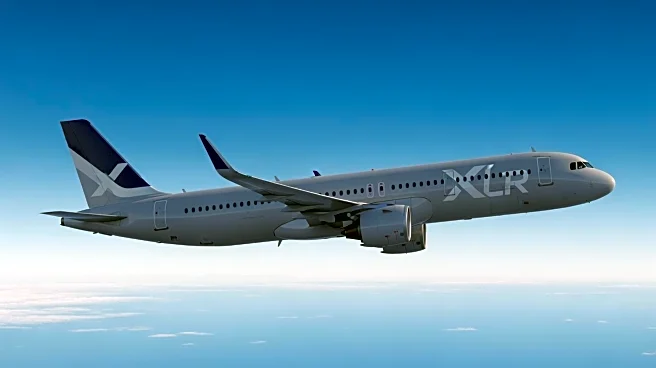What's Happening?
IndiGo, India's largest airline, is set to expand its operations with the introduction of the Airbus A321XLR, marking a significant shift in its business model. Historically focused on domestic routes with single-class aircraft, IndiGo is now venturing
into long-haul markets. The airline has ordered 69 A321XLRs, part of a larger order of 500 Airbus A320neo family aircraft. The A321XLR, known for its extended range, will allow IndiGo to operate longer routes that were previously not economically viable. The first of these aircraft is expected to be delivered soon, with service commencing in early 2026. IndiGo plans to operate these aircraft with 195 seats, including 12 premium 'IndiGo Stretch' seats and 183 economy seats. The airline's first long-haul destination with the A321XLR will be Athens, with flights from Delhi and Mumbai starting January 23, 2026.
Why It's Important?
This development is significant as it represents IndiGo's strategic move into the long-haul market, challenging traditional full-service carriers. The introduction of the A321XLR allows IndiGo to tap into new markets and potentially increase its revenue streams. The decision to fly to Athens, a route also targeted by Greek carrier Aegean, suggests a competitive strategy to capture market share in a region with growing demand for connectivity to India. This expansion could influence the dynamics of the aviation industry, particularly in the Asia-Europe corridor, by offering more options to travelers and potentially driving down prices. The move also highlights the growing importance of the A321XLR in the aviation industry, as airlines seek to optimize operations with more fuel-efficient and versatile aircraft.
What's Next?
IndiGo's expansion into long-haul markets with the A321XLR is likely to prompt responses from competitors, particularly those operating in the Asia-Europe market. Airlines like Aegean, which also plans to use the A321XLR on similar routes, may adjust their strategies to maintain competitiveness. Additionally, IndiGo's success with these new routes could lead to further expansion plans, potentially including more destinations and increased frequency of flights. The airline's approach to not offering a traditional business class on these long-haul flights may also influence other low-cost carriers considering similar expansions. As the A321XLR becomes more prevalent, it could reshape the landscape of long-haul travel, offering more direct routes and potentially altering passenger expectations for comfort and service.
Beyond the Headlines
IndiGo's decision to expand into long-haul markets with the A321XLR raises questions about the future of low-cost carriers in the long-haul segment. The airline's choice to offer a 'business class light' product rather than a full business class could set a precedent for other budget airlines looking to enter this market. This strategy may appeal to cost-conscious travelers seeking more comfort without the premium price tag. Additionally, the environmental impact of operating more fuel-efficient aircraft like the A321XLR could become a selling point for airlines as consumers become increasingly aware of sustainability issues. The success of IndiGo's long-haul expansion could also influence regulatory and infrastructure developments in the regions it serves, as airports and governments adapt to accommodate increased traffic and new market dynamics.















